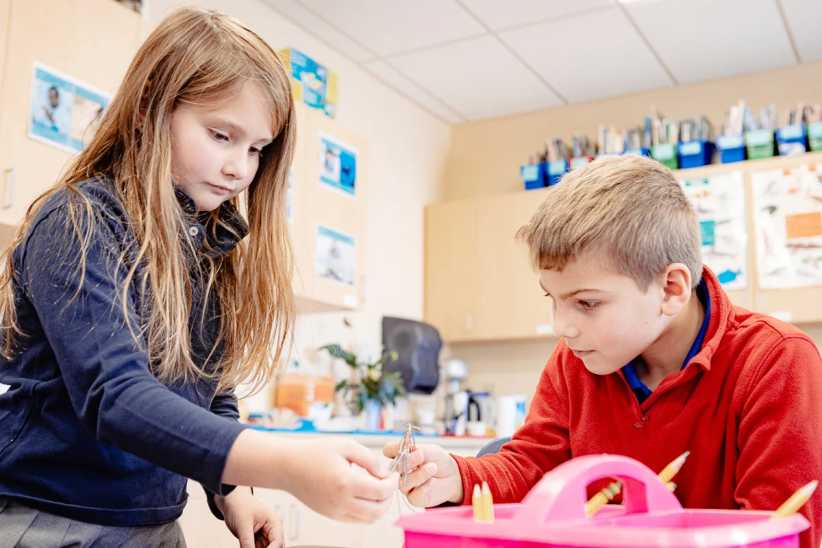It is now commonly accepted that there are differences in learning styles and that even capable, intelligent students can sometimes struggle in the classroom setting. Extra help in a one-on-one environment benefits these students by giving them individual attention and catering to their unique needs.
This presents schools with a considerable challenge. Do they attempt to meet all student struggles from within and reject tutoring as superfluous? Do they maintain a hands-off approach, believing that what happens outside the classroom is a private family matter? Or do they embrace the part these outside professionals play and welcome them into the process?
We talked with several New York City school officials who agreed: Most schools see tutors as allies. However, they believe that outside tutoring should be undertaken only when the school’s resources have been fully utilized, and that outside tutoring should be recommended in limited circumstances, and be closely monitored.

Schools meet individual needs
Schools are now making a striking number of accommodations to support students from within. The use of peer tutoring, after-school education, additional hours devoted by teachers, SEITS (Special Education Itinerant Teachers), staff learning specialists, psychologists, occupational therapists, speech therapists and other support professionals and programs are becoming increasingly popular.
The Hewitt School, a private, all-girls, K-12 school on the Upper East Side, teachers exemplifies the integration of extra support into the regular day. School officials emphatically encourage using school resources and limiting outside tutoring when possible. “There is a culture in New York of parents feeling pressure and wanting their daughters to have all the advantages. We want kids to love learning. We believe children should learn in school,” says associate head, Caroline Erisman, who enthusiastically points out the recent addition of their peer-tutoring program. The administration matches middle school with high school girls for one-on-one sessions, and this past school year, approximately 30 students participated. In addition, the school requires all teachers to be present between 3 and 3:45 pm to provide extra help to students who may need it.
At the Rodeph Sholom School on the Upper West Side, a nursery through 8th grade school with a population of 690, six full-time learning specialists, two part-time school psychologists and the consulting services of a speech therapist and occupational therapist are available for students requiring additional support. In middle school, there is an emphasis on teaching students the time management, organization and study skills necessary for success. In an effort to help students with the school’s increasingly rigorous academic program, a new position was created — Director of the Learning Center, whose job is to oversee all support services and ensure that students do not fall through the cracks. Keren Schuller, director since the creation of the position in 2006, is also responsible for referring students to tutors for enrichment and remediation on an as-needed basis.
Rose Kagle, director of Middle and Upper School Support Services at Riverdale Country School, cites as one of the hallmarks of their school that teachers are available and encourage their students to meet with them for extra help. Middle school students may choose or be asked to participate in a study skills program taught by learning specialists Deborah Bolger and Bethany Pitassi during school hours. Referral determinations for the program are made in collaboration with faculty, administration, learning specialists, and the head of support services. In addition, all 7th grade students take a course titled Organization Plus, which teaches the study and organizational skills deemed necessary for success in the middle and upper divisions. Riverdale Country School’s after-school homework help program, which meets bi-weekly, provides middle school students with access to help from learning specialists, and often individual subject teachers as well. Students may also be referred directly to one of the three staff learning specialists for one-on-one instruction.
At Horace Mann, students receive support in the form of after-school homework help four afternoons a week, plus access to the Academic Center during school hours. In addition, teachers make themselves available for extra help during free periods, and one-on-one meetings with learning specialists are arranged, when appropriate. When students are struggling, the school takes a collaborative approach, meeting with all interested parties to determine what support strategies should be implemented.
There are a number of schools that specialize in educating, and providing the necessary support for, students with learning differences. Stephen Gaynor School, which serves 5- to 14-year-olds on the Upper West Side, is one such example. Ann Miller, assistant director of education, explains that the school tries to provide all necessary support from within so that their students can have a life outside of school. Student-teacher ratios are excellent (10:2), and staff members are experienced working with this specific student population. Students’ strengths are highlighted through a diverse curriculum that includes music, art, gym, digital photography and computers.
School attitudes towards tutoring
While schools have made meaningful and successful efforts to provide students with supplemental support, teachers and administrators generally share the opinion that in some cases, outside tutoring is indeed useful — particularly in situations where academic difficulties are affecting a child’s self-esteem. A neutral third party can often find new, creative and effective ways to reintroduce curricula and help boost confidence.
According to Bernice Hauser, director of Inter-Campus Activities at Horace Mann, tutoring “is recommended only after consultation with deans, teachers, the learning center and the psychologist. When the evidence supports its need, we recommend it, but tutoring is only undertaken after the school has exhausted all avenues of support.”
“Throughout the city, kids get extra support and test prep, and we believe that whatever gives kids help should be welcomed,” says Christine Karamanoglou, director of resources at Claremont Preparatory School downtown, serving Pre-K to 8th grade students. The school provides extra support within the classroom and through learning specialists, but also welcomes tutoring when deemed necessary. Claremont Preparatory School is committed to monitoring how tutoring is approached and encouraging open communication among all parties involved so that everyone is on the same page. They also try to create an environment where no stigma is attached to tutoring, Karamanoglou explains.
According to Mary Ellen Kail, 7th to 12th grade coordinator of Columbia Grammar and Preparatory School on the Upper West Side, it is important to find highly skilled tutors who teach students how to learn and how to work towards independence in their academic lives. A good tutor, she believes, will “work toward the long-term goal of leaving the student with strategies and methods they can employ on their own, guiding students rather than giving them answers.” Tutors that help support the learning process are both “welcomed and valued by most classroom teachers at our school. The reality is that a student who is really struggling often needs more one-on-one help than the best intentioned classroom teacher can reasonably provide.”
Communication between all parties
Some schools have an informal process where department heads or learning specialists refer students from a list of tutors who are known and trusted. Others have a more rigorous, explicit policy. The Hewitt School requires meetings including the division head, classroom teacher and learning resource teacher before any recommendations are passed along to parents. This helps to ensure that the school is doing everything possible to support learning within its own walls; teachers are also prohibited from privately tutoring Hewitt students during the school year. Horace Mann refers students for tutoring only after detailed consultation with school staff and administration. Similarly, at Riverdale Country School, decisions to refer for outside support are made only after collaborative meetings to determine how a student will be best served.
But everyone agrees: Communication is crucial. Mary Ellen Kail at Columbia Grammar points out that “collaboration on behalf of a student is always in the student’s best interests. Therefore, the ideal situation would be an outside tutor who communicates productively with a student’s teachers in a collaborative spirit. It is not helpful for anyone when a tutor puts a teacher on the defensive and sets up an adversarial situation.” Christine Karamanoglou at Claremont Preparatory School notes that advances in technology (email, text messaging, and web-based calendars and syllabi, list-serves, Internet blackboards and blogs) make information exchange so much more easily manageable.
Finding a great tutor
We have found — and schools confirm — that the tutors who develop positive, productive relationships with schools do the following:
1. Clearly State Goals: Tutors who are able to incorporate both the school’s and parents’ goals are able to develop strategies that meet everyone’s needs. Those goals inform the material that they teach and how they conduct their lessons.
2. Create a Caring Atmosphere: Students must feel that their tutors understand and care about them. Tutors should spend time creating a safe, nurturing environment in which students are able to express thoughts and concerns.
3. Treat the Student as an Individual: Students cannot be plugged into a system. Good tutors are able to adjust their methods to suit the individual needs of each student. They are creative and flexible in finding ways to unlock a child’s potential.
4. Build Confidence: Often a lack of confidence must be addressed before learning can take place. Tutors should be positive motivators. They must instill the belief that students are capable of achieving, if they apply themselves.
5. Foster Independence: From the outset of tutoring, students must be taught that the end goal is for them to become responsible for their education. Good tutors provide the roadmap to independence by teaching students how to construct and maintain a system to monitor their academic development and adapt to new challenges.
Everyone involved in a child’s education has the same ultimate goal: academic success. We all want students to be productive, life-long learners and to have the sense of autonomy and increased self-esteem that comes from navigating their own educational experiences. Communication and collaboration are crucial. Furthermore, students need to feel comfortable seeking additional support and not be stigmatized for asking questions and receiving help. Mary Ellen Kail at Columbia Grammar points out that “no one works or learns in isolation and that asking questions and seeking out help is an important part of the learning process.” When we keep the student’s best interests at the forefront of our decision-making, there is no reason for tutors and schools to be in conflict. If these values are taken to heart, schools and tutors can be great “friends”.
LAURIE and JESSE GERBER are the co-founders and co-owners of Partners With Parents, a comprehensive in-home tutoring service. Services include tutoring in all subjects, academic coaching, test preparation, homework help, music lessons and homeschooling. They can be reached at (212) 928-5016 or www.partnerswithparents.com.



















